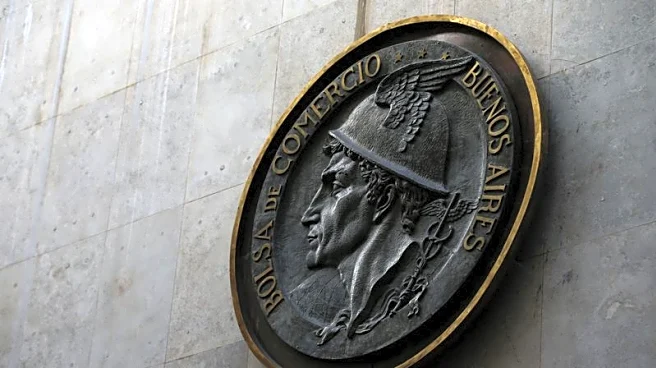Rapid Read • 8 min read
Wall Street is experiencing heightened anxiety as recent jobs data reveals a weaker-than-expected economic performance, raising fears of a potential recession. Futures tied to major indices such as the Dow Jones Industrial Average, S&P 500, and Nasdaq showed slight gains after a period of decline, with the Dow futures rising by 114 points. The yield on the 10-year Treasury increased slightly, while the U.S. dollar weakened against the euro and yen. Gold prices saw a minor increase, whereas U.S. oil prices and Brent crude experienced slight declines following an OPEC+ production surge. The economic outlook has been further complicated by President Trump's tariffs, which have not yet shown the anticipated negative impact, according to some analysts. However, concerns are growing about the politicization of economic data following the dismissal of Erika McEntarfer from the Bureau of Labor Statistics. The upcoming tariffs, set to take effect on Thursday, are expected to face increased scrutiny, particularly those affecting trade with Canada and Switzerland.
AD
The current economic situation poses significant implications for various stakeholders, including investors, businesses, and policymakers. The weak job growth, averaging only 35,000 over the past three months, coupled with declining consumer spending, housing, and manufacturing indicators, suggests that the U.S. economy may be on the brink of a recession. This scenario could lead to increased market volatility and impact investment strategies. The tariffs imposed by President Trump, particularly on key trading partners, could exacerbate economic challenges by affecting trade balances and increasing costs for businesses reliant on imported goods. Additionally, the potential politicization of economic data could undermine trust in official statistics, complicating policy decisions and market predictions. As the economic landscape becomes more uncertain, businesses and investors may need to adjust their strategies to mitigate risks associated with trade policies and economic downturns.
In the coming days, the focus will be on the implementation of new tariffs and their impact on trade relations and the broader economy. The U.S. Trade Representative has indicated that tariff rates are unlikely to change, despite previous delays. Economic reports, such as the upcoming trade deficit data and second-quarter productivity figures, will provide further insights into the effects of tariffs and the overall economic health. Earnings reports from major companies, including Palantir Technologies, Advanced Micro Devices, Caterpillar, Disney, and McDonald's, will also be closely watched for indications of how businesses are navigating the current economic environment. Pharmaceutical and biotech companies may face additional challenges as President Trump considers imposing steep tariffs on drugs. Stakeholders will need to monitor these developments closely to assess their potential impact on the economy and financial markets.
AD
More Stories You Might Enjoy












